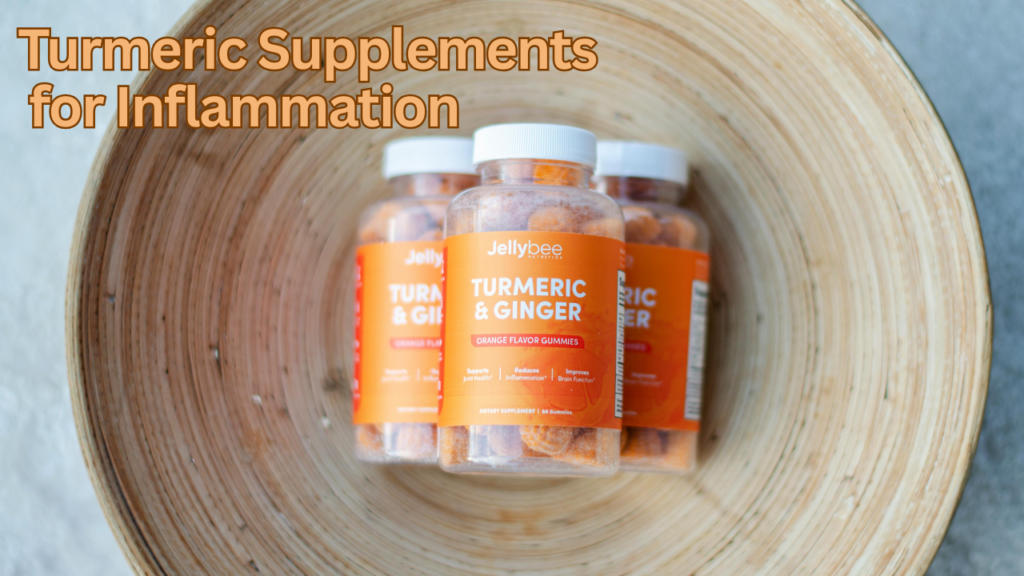In recent years, turmeric supplements for inflammation have gained immense popularity as a natural way to combat pain and swelling. This vibrant golden spice, sourced from the root of the Curcuma longa plant, has played a central role in Ayurvedic and traditional Chinese healing practices for generations.
Modern research now supports its powerful anti-inflammatory properties, making turmeric supplements a go-to remedy for those seeking relief from chronic inflammation, arthritis, and other inflammatory conditions.
In this comprehensive guide, we’ll explore how turmeric works, its benefits, the best ways to take it, potential side effects, and why it might be the perfect addition to your wellness routine.
Table of Contents
ToggleHow Turmeric Fights Inflammation

The primary active compound in turmeric is curcumin, which is responsible for its vibrant color and potent medicinal properties.
Curcumin is prized for its ability to combat inflammation and shield cells from oxidative damage. It works by neutralizing harmful free radicals and easing oxidative stress throughout the body.
Research shows that curcumin inhibits key inflammatory pathways by blocking molecules like NF-kB—a protein complex that triggers inflammation at the cellular level.
By modulating these pathways, turmeric supplements can help alleviate symptoms of:
Arthritis (osteoarthritis and rheumatoid arthritis)
Joint pain and stiffness
Muscle soreness after exercise
Digestive inflammation (IBD, Crohn’s disease)
Chronic inflammatory conditions
Unlike over-the-counter NSAIDs (like ibuprofen), which can cause stomach ulcers and kidney damage with long-term use, turmeric offers a safer, natural alternative with fewer side effects.
Top Benefits of Turmeric Supplements for Inflammation
1. Reduces Joint Pain and Arthritis Symptoms

Studies have found that curcumin is as effective as some anti-inflammatory drugs in managing arthritis pain. A 2016 study published in the Journal of Medicinal Food showed that turmeric extract significantly reduced joint pain and improved mobility in osteoarthritis patients.
2. Supports Heart Health

Since chronic inflammation is a key driver of heart disease, curcumin’s anti-inflammatory action may offer cardiovascular support. It improves endothelial function, reduces LDL cholesterol, and prevents plaque buildup.
3. Aids Digestive Health

Turmeric stimulates bile production, aiding digestion and reducing bloating. It also soothes conditions like IBS and ulcerative colitis.
4. Speeds Up Recovery from Exercise

Athletes use turmeric supplements to reduce post-workout muscle soreness. Its ability to minimize oxidative damage aids quicker muscle repair and recovery.
5. Boosts Brain Function

Curcumin crosses the blood-brain barrier, reducing brain inflammation. This may support memory and cognitive function, particularly in neurodegenerative diseases like Alzheimer’s.
How to Take Turmeric Supplements for Maximum Benefits
1. Choose the Right Supplement
Look for bioavailable forms like curcumin with piperine (black pepper extract), which enhances absorption by up to 2000%.
Liposomal turmeric and nano-curcumin offer better absorption.
Choose standardized extracts with at least 95% curcuminoids
2. Dosage Recommendations
General inflammation: 500–1,000 mg per day
Chronic pain/arthritis: 1,000–1,500 mg daily (split doses)
Acute inflammation: Up to 2,000 mg daily (short-term use)
3. Best Time to Take Turmeric
With meals to avoid stomach upset
Alongside healthy fats (e.g., coconut oil, fish oil) to boost absorption
Potential Side Effects and Precautions

Turmeric is generally safe, but high doses may cause:
Mild stomach upset or diarrhea
Blood-thinning effects (avoid with anticoagulants like Warfarin)
Gallbladder issues (consult your doctor if you have gallstones)
Who Should Avoid Turmeric Supplements?

Pregnant or breastfeeding women
People scheduled for surgery
Individuals with low iron levels (curcumin may inhibit iron absorption)
Turmeric vs. Other Anti-Inflammatory Supplements
| Supplement | Key Benefits | Best For |
|---|---|---|
| Turmeric (Curcumin) | Anti-inflammatory, antioxidant, joint pain relief | Chronic inflammation, arthritis |
| Omega-3 (Fish Oil) | Reduces systemic inflammation, heart support | General inflammation, heart health |
| Ginger | Anti-inflammatory, aids digestion | Nausea, muscle pain |
| Boswellia | Reduces joint inflammation | Osteoarthritis, back pain |
Among the many herbal supplements, turmeric shines for its comprehensive ability to reduce inflammation and combat cellular stress.
Final Thoughts: Are Turmeric Supplements Right for You?

If you’re struggling with chronic inflammation, joint pain, or digestive issues, turmeric supplements may offer a safe and effective solution.
With well-documented benefits and minimal side effects, turmeric is a powerful natural remedy worth considering.
For best results, choose a high-quality supplement with enhanced absorption, pair it with a healthy diet, and consult your doctor if you have any health conditions.
FAQ: Turmeric Supplements for Inflammation
Q: How long does it take for turmeric to reduce inflammation?
A: Most people notice improvements within 4–8 weeks, but high doses can bring relief in as little as 2 weeks.
Q: Can I take turmeric with other medications?
A: Speak with your healthcare provider before combining turmeric with blood thinners, diabetes medications, or acid reflux drugs.
Q: What’s better: turmeric powder or capsules?
A: Capsules offer precise dosing and higher curcumin content; powder is less concentrated but still beneficial in food.
Q: Does turmeric help with autoimmune inflammation?
A: Yes, research suggests curcumin may help modulate immune responses in conditions like rheumatoid arthritis and lupus.

